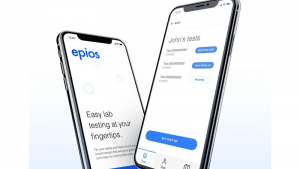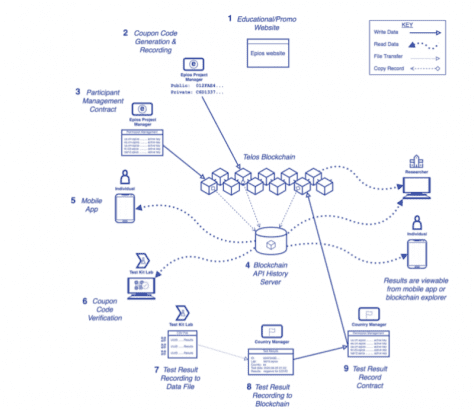
“The Epios Project and mobile app are prime examples of how blockchain technology can be used to securely collect, anonymize and manage public health data,” said Suvi Rinkinen, CEO at The Telos Foundation. “At the same time, this is an example of how Telos empowers people of different talents and experiences to collaborate to achieve a common purpose. We look forward to working with additional partners to grow Epios and improve disease testing and outcomes worldwide.”

The need
There are a variety of reasons why anonymous COVID-19 testing can provide better data and health outcomes. Many individuals prefer to receive health information anonymously. Others may fear mistreatment by governments, employers or insurers due to a positive test result.
In effect, there is both a personal risk and a general or population risk. The personal risk is that individuals avoid testing, in case of mistreatment (as described above). The general risk arises if individuals, by foregoing the testing they should have, end up spreading the infection.
Addressing both of these concerns is what Telos with the Epios Project is attempting. The Epios mobile app will serve as a nexus between individuals seeking anonymous testing and test providers. Routing test kit processing through the Epios app – and recording results on the Telos public blockchain – means the links between identities and test results can be eliminated.
Telos Foundation and the Epios app
Epios’ flagship product is a mobile app which connects:
- individuals seeking anonymous testing
- providers who can supply and process test kits in compliance with local requirements.
By processing tests through Epios on the Telos chain, the potential for linkages to occur – between individuals’ identities and their results – disappears. The Epios mobile app will become available on the App Store and Google Play on July 18.
Epios uses a new, patent-pending, method for recording anonymous information within a system requiring disclosure of personally identifiable information. Epios ensures that no payment is made directly by the testing subject to the processing lab. Instead it prefers a cryptographically protected coupon provided along with each test kit. Because every coupon has cryptographic hash values as untraceable codes, labs can verify a payment is valid without tracing it to a specific purchasing individual.

“By providing an option for structurally anonymous testing, people may be more likely to get tested and take better precautions if their results are positive,” said Douglas Horn, Chief Architect of the Telos Blockchain and Epios Project Lead. “Providing aggregate, anonymous results to researchers with some geographic granularity also helps the medical community and policymakers make more informed decisions for the COVID-19 pandemic and future epidemics.”
Application of the app
The Epios Project aims to create a network of project, regional, and country managers. These will be able to:
- arrange permissions for third-party organisations
- record and access data on the blockchain.
Epios solves the linkage problem through the use of a cryptographically protected physical payment coupon which is provided along with the test kit. The Epios mobile app will record the private key which is the record locator associated with the individual’s test results, when available. Individuals will also have the option to record the numeric version of this record locator in other ways – as a backup to ensure access to the records (in case they lose access to their mobile device). the individual then returns the completed testing kit (with sample) in the provided envelope along with the coupon.
On receipt of the test sample, the lab verifies the associated coupon prior to processing the sample. This ensures each lab will receive due payment. Because these coupons use unique cryptographic hashed values, a lab can also verify a coupon is valid and has not previously been used – all without any connection to the individual who purchased the test.
When the test result is available, the lab places the result on the blockchain. The purchaser can then access the results using the private key. The Epios Project plans to work with NGOs, government bodies and other partners to exploit the Epios app and network. Meanwhile, health-related organisations can see the broader epidemic picture through accessing the blockchain – but without each individual’s personal details.
Enterprise Times: what does this mean
The principle behind the Epios Project is that people have the right to control the disclosure of their own personal information. No one should have this information becoming the price of receiving testing for epidemic illnesses (this approach applies beyond COVID-19). The underlying assumption is that disease testing without the option of anonymity ultimately produces negative impacts on controlling an epidemic.
Epios is using blockchain and mobile technology to reduce worries about unintended consequences or inappropriate disclosure of test results – by providing system-assured anonymity. Telos and the Epios Project hope this will establish an environment where more people volunteer for tests without the fear of repercussions. In so doing they protect themselves – and the rest of the population.


























